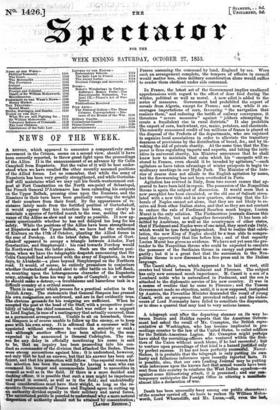In France, the latest ad of the Government implies nnallayed
apprehensions with regard to the effect of dear food during the winter, political as well as moral. A new edict is added to the series of measures. Government had prohibited the export of cereals from Algeria, except for France; and now, while it en- courages importations of corn, favouring "the navigation that realizes them," and reducing the tariffs of railway conveyance, it threatens "severe measures" against "jobbers attempting to create a fraudulent rise in rural districts." It also prohibits the export of corn, buckwheat, rye, maize, potatoes, and chestnuts. The recently announced credit of ten millions of francs is placed at the disposal of the Prefects of the departments, who are enjoined to organize local associations in order to alleviate the transitory dearness of provisions by the distribution of bread, &c., and by in- voking the aid of private charity. At the same time that the Em- peror is thus regulating imports and exports, and taking the initi- ative in universal charity, his Minister announces that he shall know how to maintain that calm which his "energetic will re- stored to France, even should it be invaded by agitators,"—such agitators as have taken advantage of winter prospects to begin tu- multuary meetings in our Hyde Park. The Minister of the Inte- rior of course does not allude to the English agitation by name, but the forewarning has not been overlooked in Paris.
Agitation has revived in Italy, from two recent causes that ap- peared to have been laid in repose. The possession of the Neapolitan throne is again the subject of discussion. It would seem that a new pamphlet has been circulated, or the old one of Salieeti circu- lated with a new title and in new quarters, showing that the Li- berals of Naples cannot act alone, that they are not likely to re- ceive aid from other Italian states, and that as they are not content to endure the rule of Ferdinand Bourbon much longer, Lucien Murat is the only solution. The Piedmontese journals discuss this pamphlet freely, but not altogether favourably. It has been ad- mitted by Austrians, as well as the countrymen of other states, that if Piedmont and Naples were of one mind, they must rule Italy, which would be ipso facto independent. But to realize that calcu- lation, the new King of Naples should be a man able to oompre- hend the opportunity that lies before him ; and of that capacity Lucien Murat has given no evidence. We have not yet seen the pre- tender to the Neapolitan throne who could be expected to emulate the possessor of the Sardinian throne in energy and praetioal sa- gacity; but it is a great fact that the succession to the Nea- politan throne is now discussed in a free press and in the Italian -language.
The Casati affair, too, which appeared to be laid at rest, still creates bad blood between Piedmont and Florence. The subject has only now assumed much importance. M. Casati is a son of a Lombard noble who is naturalized in Piedmont, and the son is attached to the diplomatic service of his new country. It was in a course of routine that he came to Florence ; and the Tuscan Government made no objection, until, it is now supposed, instigated by Austria, the Florentine Minister demanded the recall of young Casati, with an arrogance that provoked refusal ; and the endea- vours of Lord Normanby have failed to conciliate the disputants, or to close a quarrel that may lead to very serious issues.


























